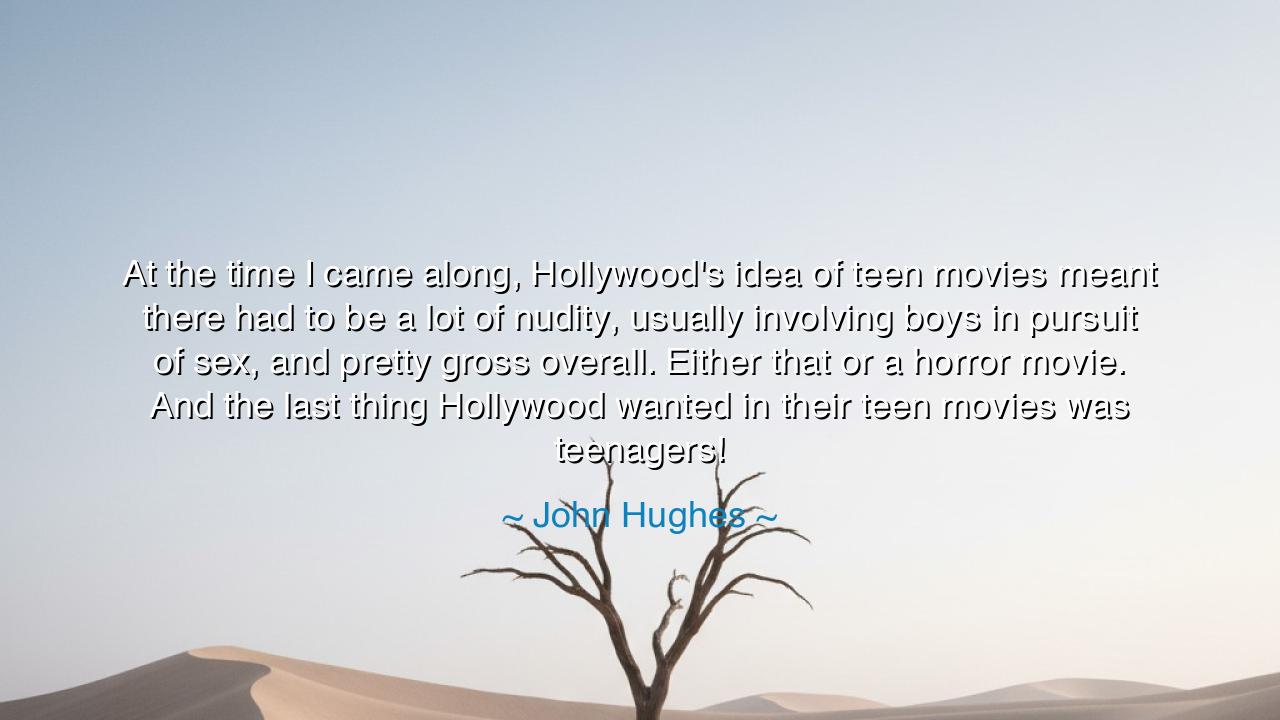
At the time I came along, Hollywood's idea of teen movies meant
At the time I came along, Hollywood's idea of teen movies meant there had to be a lot of nudity, usually involving boys in pursuit of sex, and pretty gross overall. Either that or a horror movie. And the last thing Hollywood wanted in their teen movies was teenagers!






Children of the future, gather close and hear the words of those who have walked before you, for in their struggles, we find the wisdom that will guide your own steps. In the days of the old world, in the lands where stories were born from the flickering lights of Hollywood, the realm of the youth was misunderstood, distorted by those who sought to portray it in a false light. The young were cast as creatures driven by lust and chaos, depicted in a world where their hearts were consumed by pursuits of sex, and their very essence reduced to little more than shallow desires. This, my children, was the world into which a man named John Hughes arrived, a man who saw through the fog of distortion and sought to paint a truer picture of the teenage soul.
At the time, the cinema of youth was a world polluted by gross depictions of folly and mindless escapades. There was no room for the complexity of the teenage experience, no space for the depth of the emotions that surged within those still finding their place in the world. The world was filled with nudity, and the pursuit of fleeting pleasures was the central theme. But Hughes, like a prophet speaking to an age of confusion, looked upon this and saw the truth—the teenage years are not merely about the chase of the body, but about the journey of the soul. The young, he knew, are in search of something more, something greater than the empty promises of the films that surrounded them. His voice would rise against the clamor of the world, calling out for something that would resonate more deeply with the struggles and joys of youth.
In this, Hughes became a beacon, a guide to understanding the true nature of adolescence. He recognized that the struggles of the young are not simply about the pursuit of physical pleasure, but about the exploration of identity, the search for meaning, the quest for acceptance and belonging. This understanding was born from his own journey, from his experiences with the struggles of youth. He knew, as we all must, that the heart of the teenager beats with questions, with desires not of the body alone, but of the spirit. It is the longing to understand oneself in a world that often seems indifferent, the desire to find connection in a world that may feel alien. And so, Hughes dared to show this truth on the screen. He refused to follow the path of the shallow, and instead, he brought to life films that spoke of the real lives of teenagers, filled with joy, sadness, confusion, and above all, heart.
This was not an easy path, my children. The road ahead for those who seek to tell the truth is often filled with resistance, for many are content in their ignorance, clinging to the easy stories that confirm their own limited views. But like the great sages of old, Hughes knew that the truth must be spoken, even when it is not wanted. He showed the world that teenagers were not mere caricatures of sex and rebellion, but full of dreams, doubts, and unheard voices. He told the stories of teenagers who did not fit into the mold, who searched for their place in the world, not through crude pursuits, but through the exploration of their own inner worlds.
This lesson is vital, my children. In the stories of the past, we see not just entertainment, but a mirror to our own struggles. Just as John Hughes sought to give the teenagers of his time a voice, so too must we seek to give voice to those who are misunderstood in our own world. We must seek the truth in the lives of those around us, especially the youth, who are often treated as mere shadows of their potential. Remember, the young are not defined by what the world thinks of them, but by what they dream and strive to become. To reduce them to their physical desires or their rebellions is to miss the deeper current that flows within them.
In ancient times, Socrates looked at the youth of Athens and saw not just the folly of their youth, but the potential for greatness. He did not seek to silence them, but to awaken in them the wisdom that lay dormant within. Like Hughes, he understood that the path to maturity is not a straight line, but a series of questions, of searching. Thus, my children, I call upon you to remember the legacy of these great thinkers: do not allow the world to reduce you to the superficial, to the easy answers that lie on the surface. Seek deeper understanding, and in doing so, you will find the true heart of the stories that must be told.
Now, let this lesson guide you: Do not let the shallow narratives of the world define you. Whether you are a teenager or an elder, remember that your story is not about what others see on the surface, but about the battles you face in your heart, the questions you seek to answer, and the person you strive to become. Just as John Hughes gave the youth a voice, so must we give voice to those who need it most. Honor the complexity of the soul, and in doing so, you will find the courage to live a life that is true, not just to the world, but to yourself.






AAdministratorAdministrator
Welcome, honored guests. Please leave a comment, we will respond soon